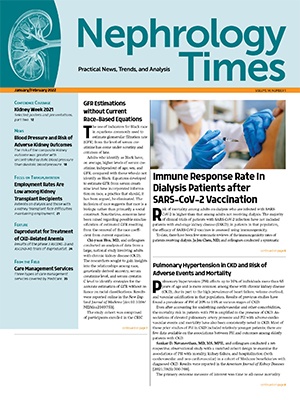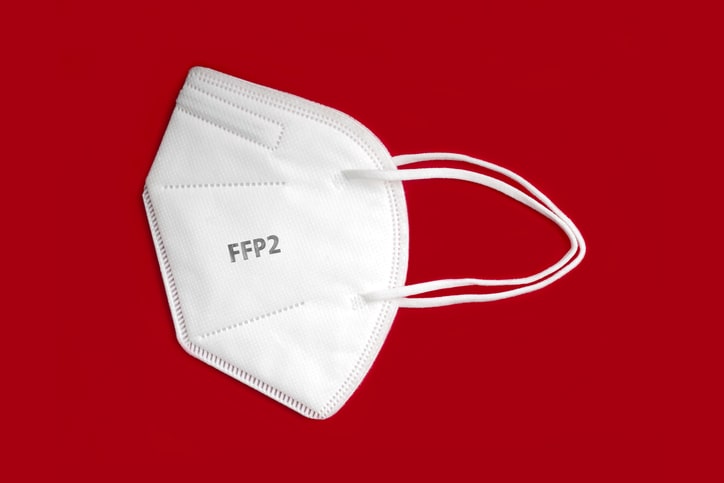
The most common comorbidity among patients with chronic kidney disease (CKD) is hypertension. Uncontrolled hypertension can result in adverse clinical outcomes, including myocardial infarction, acute coronary syndrome, ischemic stroke, heart failure, and death. High blood pressure also affects the kidney itself, and uncontrolled hypertension is a key factor in the loss of kidney function. Blood pressure control is an important therapeutic strategy in patients with CKD to prevent hypertension-related complications.
At present, optimal blood pressure targets are undetermined. The American College of Cardiology/American Heart Association suggest lowering target systolic blood pressure to <130 mm Hg. However, the effect of a lower blood pressure target on kidney function remains a concern. Results of previous studies and meta-analyses of randomized controlled trials have not shown that intensive blood pressure control is effective in reducing the risk of kidney failure. All clinical trials had cardiovascular outcomes and mortality as primary outcomes; adverse kidney events were analyzed a secondary outcomes.
The optimal blood pressure control for preventing progression of CKD is unclear. Jee Young Lee, MD, and colleagues in the Republic of Korea conducted a prospective observational cohort study to examine the association between blood pressure and adverse kidney outcomes among participants in the Korean Cohort Study for Outcome in Patients with CKD (KNOW-CKD). Results were reported in the American Journal of Kidney Diseases [2021;78(2):236-244).
The primary outcome of interest was a composite kidney outcome of a ≥50% decline in estimated glomerular filtration rate (eGFR) from baseline or incident kidney replacement therapy. The study participants were 2044 patients in the KNOW-CKD trial in Korea.
At study entry, 32.4% (n=663) of participants had diabetes mellitus and 15.6% (n=318) had cardiovascular disease. During follow-up, there were a median of four measurement of blood pressure and four of creatinine. In general, the patients with higher systolic blood pressure were older, more likely to have diabetes and cardiovascular disease, and had lower kidney function than those with lower systolic blood pressure.
During 7472 years of follow-up over a median of 3.66 years, the primary composite outcome occurred in 23.1% (n=473) of participants, for an incidence rate of 63.3 (95% confidence interval [CI], 57.9-69.3) per 1000 patient-years. All-cause deaths occurred in 74 patients; of those 31 died before reaching the composite kidney outcome. Compared with systolic blood pressure of <120 mm Hg, event rates for the composite kidney outcome were greater at higher baseline levels of systolic blood pressure. In analyses with categories of diastolic blood pressure, rates of the composite kidney outcome events were higher in the 70-79 and 80-89 mm Hg categories compared with diastolic blood pressure of <70 and ≥90 mm Hg.
Using cause specific hazards model, the researchers examined the association between systolic blood pressure levels and the risk of the composite kidney outcome. In the fully adjusted model, using baseline systolic blood pressure as a categorical measure, there was a weak but graded association of baseline systolic blood pressure with the risk of the composite kidney outcome. Compared with systolic blood pressure <120 mm Hg, the hazard ratios (HRs) for 120-129, 130-139, and ≥140 mm Hg were 1.10 (95% CI, 0.84-1.44), 1.20 (95% CI, 0.93-1.59), and 1.43 (95% CI, 1.07-191), respectively. There was no significant difference in the risk of the composite kidney outcome among systolic blood pressure categories <140 mm Hg.
The researchers conducted an analysis of the association of systolic blood pressure with the composite kidney outcome using a marginal structural model while accounting for changes in systolic blood pressure over time and for potential confounding of other time-dependent covariates. In this analysis, the graded association of time-updated systolic blood pressure levels with the composite kidney outcome was more apparent. Compared with systolic blood pressure <120 mm Hg, the HRs for 120-129, 130-139, and ≤140 mm Hg were 1.31 (95% CI, 0.98-1.75), 1.59 (95% CI, 1.16-2.16), and 2.29 (95% CI, 1.69-3.11), respectively. In the time-updated model, the risk of the composite kidney outcome began to increase with systolic blood pressure was >130 mm Hg.
In analyses with diastolic blood pressure, there was no association between baseline diastolic blood pressure and the risk of the composite kidney outcome. In the adjusted model using baseline diastolic blood pressure, using diastolic blood pressure <70 mm Hg as the reference group, the HRs for 70-79, 80-89 and ≥90 mm Hg were 1.19 (95% CI, 0.91-1.56), 1.16 (95% CI, 0.88-1.54), and 1.23 (95% CI, 0.88-1.17), respectively. In the time-updated diastolic blood pressure model, the corresponding HRs were 1.18 (95% CI, 0.89-1.56), 1.31 (95% CI, 0.99-1.75), and 1.74 (95% CI, 1.24-2.46), respectively. This association was consistent in an additional time-updated model using averaged diastolic blood pressure.
Compared with patients with systolic blood pressure <120 mm Hg, those with higher systolic blood pressure had steeper slopes of eGFR decline. In the model that included both systolic blood pressure and diastolic blood pressure, only systolic blood pressure was significantly associated with the composite kidney outcome.
Limitations to the study cited by the authors included the observational design, not examining other outcomes such as mortality and cardiovascular events in defining optimal blood pressure, performing blood pressure measurements at the clinic office rather than collecting ambulatory or home blood pressure measurements, the possibility of residual confounding, and including only Korean patients in the cohort.
In conclusion, the authors said, “Analyses with KNOW-CKD data confirm previous findings of a significant association of higher blood pressure levels with CKD progression. The stronger association with time-updated blood pressure suggests that a single measured baseline blood pressure is not a reliable predictor and underscores the importance of prolonged and sustained blood pressure control. However, determining an optimal blood pressure target in patients with CKD remains a future challenge.”
Takeaway Points
- Researchers in Korea conducted a prospective observational study using data from the KNOW-CKD study to examine the association between blood pressure and adverse kidney outcomes.
- The outcome of interest was a composite kidney outcome of a ≥50% decline in eGFR from baseline or incident kidney replacement therapy.
- There were associations between systolic blood pressure and diastolic blood pressure and a higher risk of the composite kidney outcome. The association was greater with systolic blood pressure than diastolic blood pressure.







 © 2025 Mashup Media, LLC, a Formedics Property. All Rights Reserved.
© 2025 Mashup Media, LLC, a Formedics Property. All Rights Reserved.